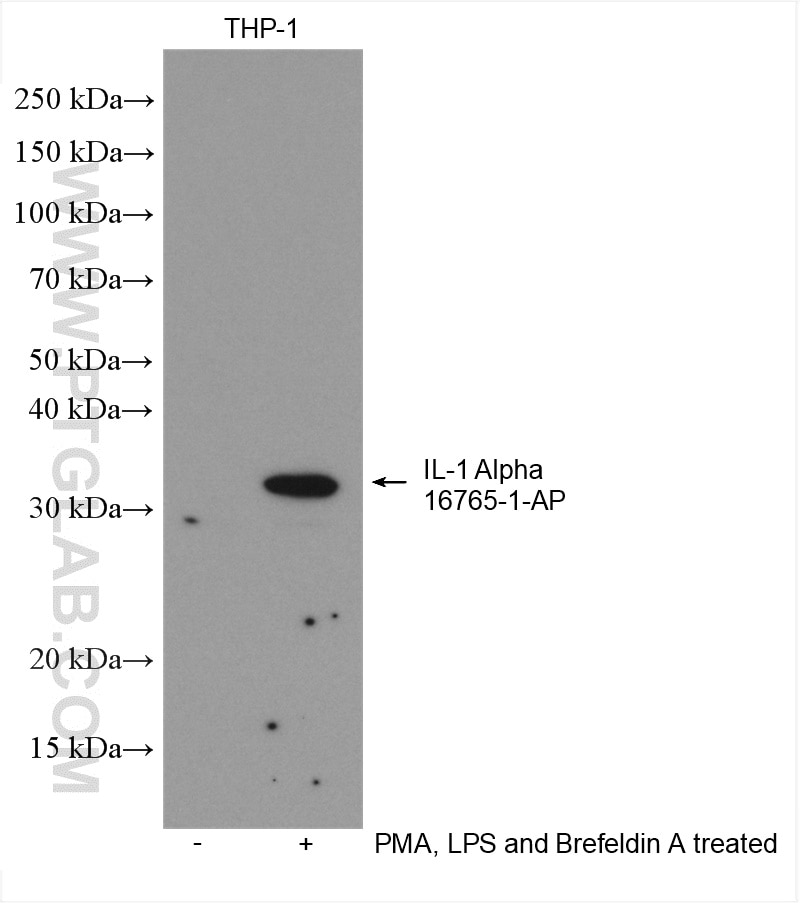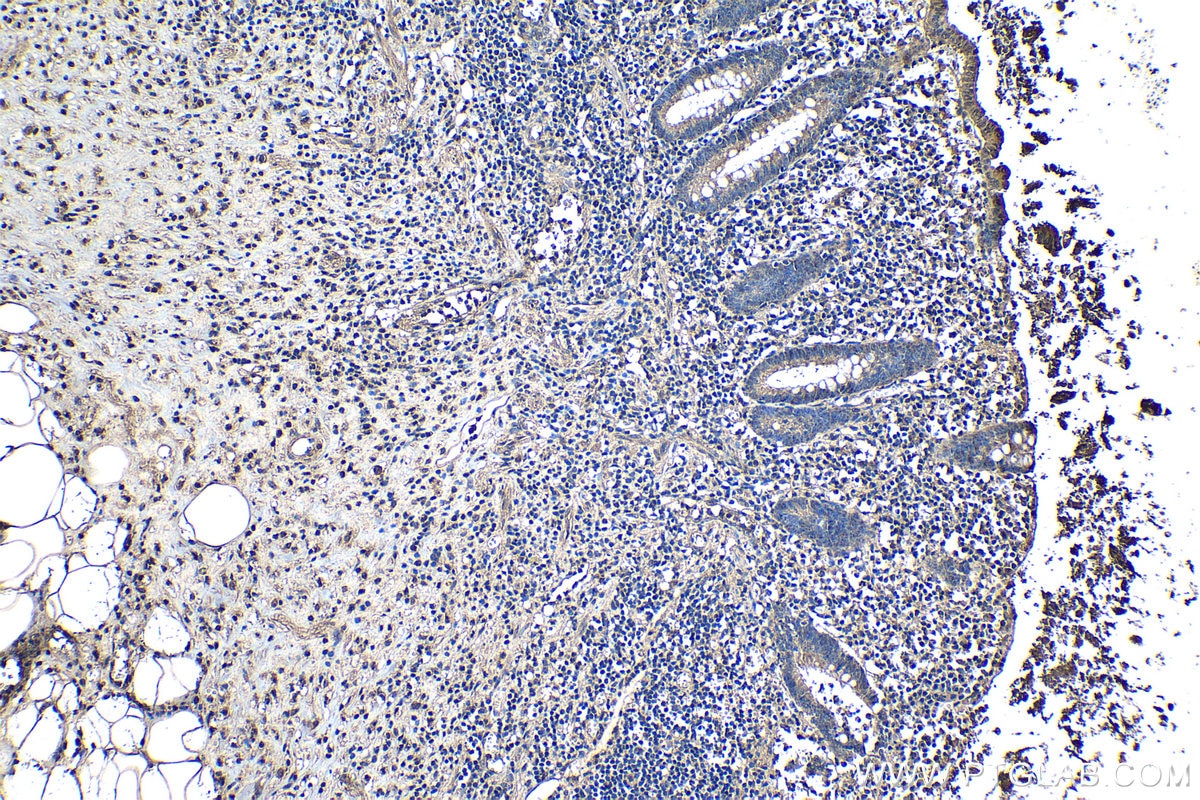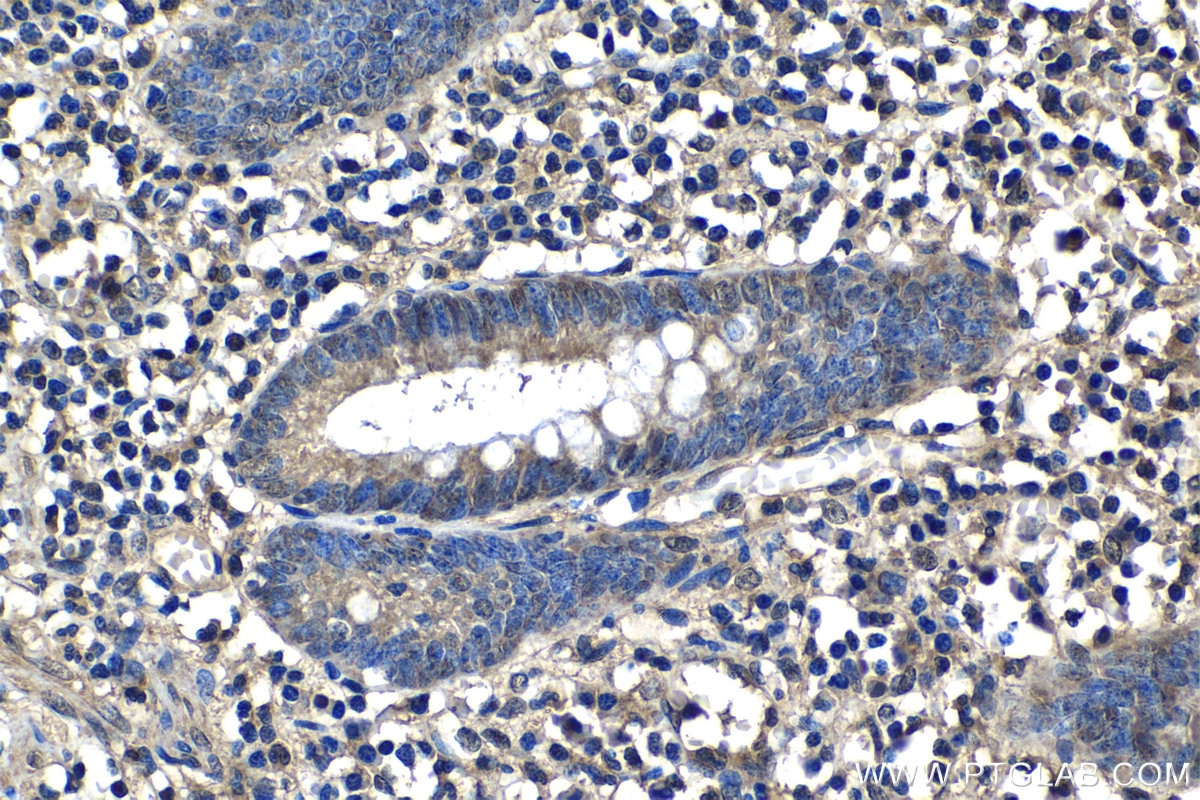Tested Applications
| Positive WB detected in | PMA, LPS and Brefeldin A treated THP-1 cells |
| Positive IHC detected in | human appendicitis tissue Note: suggested antigen retrieval with TE buffer pH 9.0; (*) Alternatively, antigen retrieval may be performed with citrate buffer pH 6.0 |
Recommended dilution
| Application | Dilution |
|---|---|
| Western Blot (WB) | WB : 1:500-1:2000 |
| Immunohistochemistry (IHC) | IHC : 1:50-1:500 |
| It is recommended that this reagent should be titrated in each testing system to obtain optimal results. | |
| Sample-dependent, Check data in validation data gallery. | |
Published Applications
| WB | See 28 publications below |
| IHC | See 15 publications below |
| IF | See 11 publications below |
| ELISA | See 1 publications below |
Product Information
16765-1-AP targets IL-1 alpha in WB, IHC, IF, ELISA applications and shows reactivity with human samples.
| Tested Reactivity | human |
| Cited Reactivity | human, mouse, rat |
| Host / Isotype | Rabbit / IgG |
| Class | Polyclonal |
| Type | Antibody |
| Immunogen |
CatNo: Ag10339 Product name: Recombinant human IL-1 alpha protein Source: e coli.-derived, PGEX-4T Tag: GST Domain: 1-271 aa of BC013142 Sequence: MAKVPDMFEDLKNCYSENEEDSSSIDHLSLNQKSFYHVSYGPLHEGCMDQSVSLSISETSKTSKLTFKESMVVVATNGKVLKKRRLSLSQSITDDDLEAIANDSEEEIIKPRSAPFSFLSNVKYNFMRIIKYEFILNDALNQSIIRANDQYLTAAALHNLDEAVKFDMGAYKSSKDDAKITVILRISKTQLYVTAQDEDQPVLLKEMPEIPKTITGSETNLLFFWETHGTKNYFTSVAHPNLFIATKQDYWVCLAGGPPSITDFQILENQA Predict reactive species |
| Full Name | interleukin 1, alpha |
| Calculated Molecular Weight | 271 aa, 31 kDa |
| Observed Molecular Weight | 30 kDa |
| GenBank Accession Number | BC013142 |
| Gene Symbol | IL-1 alpha |
| Gene ID (NCBI) | 3552 |
| RRID | AB_10641044 |
| Conjugate | Unconjugated |
| Form | Liquid |
| Purification Method | Antigen affinity purification |
| UNIPROT ID | P01583 |
| Storage Buffer | PBS with 0.02% sodium azide and 50% glycerol, pH 7.3. |
| Storage Conditions | Store at -20°C. Stable for one year after shipment. Aliquoting is unnecessary for -20oC storage. 20ul sizes contain 0.1% BSA. |
Background Information
Interleukin-1α (IL-1 alpha) is a protein that plays a crucial role in the regulation of a number of key cellular processes. IL-1 Alpha is a cytokine and a potent mediator of body's response to inflammation, microbial invasion, tissue injury and immunological response. In addition, recent studies suggest that IL-1 Alpha also has a role in wound healing, rheumatoid arthritis, Alzheimer's disease and tumor growth. IL-1 Alpha functions as an alarmin during the process of sterile inflammation. It serves as a signal from dying cells to potentiate the inflammatory response, increasing the expression of other secreted factors like IL-6 and IL-8. IL-1 Alpha was found to affect the cell cycle of osteosarcoma cell to reduce cell growth. IL-1 Alpha is initially translated as approximately 30-kD polypeptides that are processed to approximately 17.5-kD polypeptides prior to, or during, release from macrophages.
Protocols
| Product Specific Protocols | |
|---|---|
| IHC protocol for IL-1 alpha antibody 16765-1-AP | Download protocol |
| WB protocol for IL-1 alpha antibody 16765-1-AP | Download protocol |
| Standard Protocols | |
|---|---|
| Click here to view our Standard Protocols |
Publications
| Species | Application | Title |
|---|---|---|
Cell Metab Lighting up arginine metabolism reveals its functional diversity in physiology and pathology | ||
Nat Commun Schwann cells regulate tumor cells and cancer-associated fibroblasts in the pancreatic ductal adenocarcinoma microenvironment | ||
Brain Behav Immun Egln3 expression in microglia enhances the neuroinflammatory responses in Alzheimer's disease | ||
Gut Microbes Fusobacterium nucleatum promotes esophageal squamous cell carcinoma progression and chemoresistance by enhancing the secretion of chemotherapy-induced senescence-associated secretory phenotype via activation of DNA damage response pathway | ||








